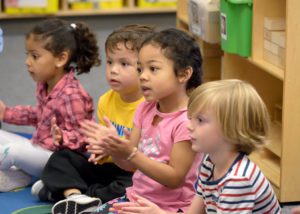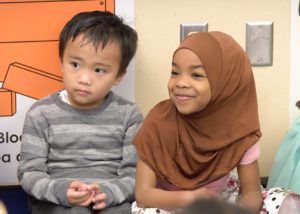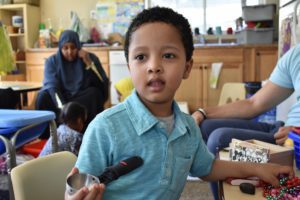2020 Legislative Priority: Early Childhood Education
By League of Education Voters Policy Team
In the 2020 legislative session, League of Education Voters will prioritize policies to help lay the foundation of an equitable educational system that provides what students need, when and where they need it.
We believe students come first, and we are dedicated to designing an equitable education system that serves all students based on their strengths, supports their needs, and provides the resources they need to be successful.
We are dedicated to designing an equitable education system that serves all students based on their strengths, supports their needs, and provides the resources they need to be successful.
We are committed to working to close gaps experienced by historically and systemically underserved students — including students of color, students in poverty, students qualifying for special education services, students learning English, and students impacted by trauma.
We believe this will lead to all students experiencing greater success and reaching their full potential.
DATA

90% of human brain growth happens from birth to age six, but 98% of our state’s educational investments happen after kids reach age five.
Increasing our state investments in the crucial ages from birth to age five supports improved educational outcomes throughout a child’s life. High-quality early childhood education has positive impacts on kindergarten readiness (1), third grade reading levels (2), performance on tests throughout elementary school and to the end of high school (3), high school graduation (4), and enrollment and persistence in postsecondary education (5). The benefits also encompass a wide array of positive societal outcomes, including less engagement with the criminal justice system, and increased earnings and family stability as an adult (6). Home visiting – an early childhood education strategy in which a nurse or other professional coordinates services to families in their home – decreases the likelihood of abuse or neglect (7) while improving family economic self-sufficiency (8). Read More
 In our podcast, we interview policymakers, partners, and thought leaders to spotlight education policies, research, and practices so that together we can create a brighter future for every Washington student.
In our podcast, we interview policymakers, partners, and thought leaders to spotlight education policies, research, and practices so that together we can create a brighter future for every Washington student. In 2018, our state had a 30-point kindergarten readiness gap between kindergarteners from low income families and their non-low income peers. Kindergarten readiness is one variable that supports kids to do well in elementary school and beyond, and the income-based opportunity gap means that children from low income households will have more work to reach grade level than their peers.
In 2018, our state had a 30-point kindergarten readiness gap between kindergarteners from low income families and their non-low income peers. Kindergarten readiness is one variable that supports kids to do well in elementary school and beyond, and the income-based opportunity gap means that children from low income households will have more work to reach grade level than their peers. High-quality early childhood education can ensure that kids start school kindergarten ready, and increase test scores throughout their elementary and high school education (1). These benefits are particularly important for kids from low income families, who face more income-related stress and are more likely to have all parents working. Currently, only 33% of kindergarteners from low-income households enter school fully kindergarten ready – nearly half the rate of kindergarten readiness for their non-low income peers (2).
High-quality early childhood education can ensure that kids start school kindergarten ready, and increase test scores throughout their elementary and high school education (1). These benefits are particularly important for kids from low income families, who face more income-related stress and are more likely to have all parents working. Currently, only 33% of kindergarteners from low-income households enter school fully kindergarten ready – nearly half the rate of kindergarten readiness for their non-low income peers (2).  My name is Lauryn Terry and I am 14 years old from Olympia, WA. When I was 3, I was an ECEAP student. ECEAP, the Early Childhood Education and Assistance Program, taught me a lot of things. I remember being little and people not being able to understand me when I was talking. When I went to preschool, people there helped me to communicate better. I didn’t know it then, but I know now that they helped my mom get me the help I needed to get surgery on my ears, speech therapy, and to learn how to talk and make me able to hear.
My name is Lauryn Terry and I am 14 years old from Olympia, WA. When I was 3, I was an ECEAP student. ECEAP, the Early Childhood Education and Assistance Program, taught me a lot of things. I remember being little and people not being able to understand me when I was talking. When I went to preschool, people there helped me to communicate better. I didn’t know it then, but I know now that they helped my mom get me the help I needed to get surgery on my ears, speech therapy, and to learn how to talk and make me able to hear. When Washington state five-year-olds arrive in kindergarten each year, they are beginning an educational journey on which some of them are already behind their classmates. Our state has a 30-point kindergarten readiness gap – only 31% of kindergarteners from low income families are fully school ready, compared to 60% of their non-low income peers (1).
When Washington state five-year-olds arrive in kindergarten each year, they are beginning an educational journey on which some of them are already behind their classmates. Our state has a 30-point kindergarten readiness gap – only 31% of kindergarteners from low income families are fully school ready, compared to 60% of their non-low income peers (1). 90% of human brain growth happens from birth to age six, but 98% of our state’s educational investments happen after kids reach age five.
90% of human brain growth happens from birth to age six, but 98% of our state’s educational investments happen after kids reach age five. Governor Jay Inslee released his
Governor Jay Inslee released his 
 South Seattle’s Voices of Tomorrow
South Seattle’s Voices of Tomorrow